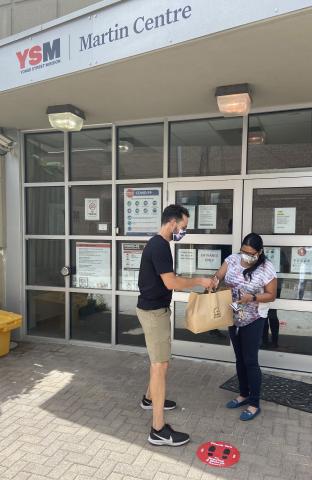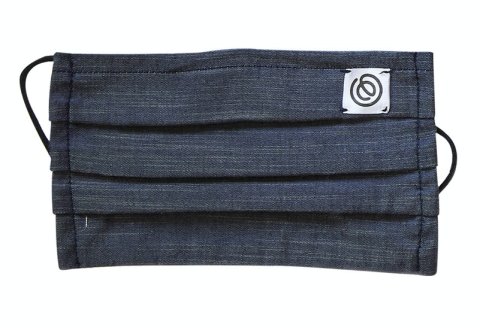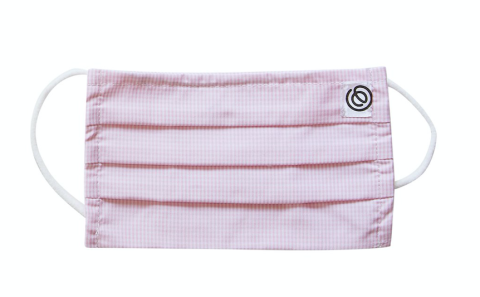
When it reopened a couple of months later, the ambitious Toronto designer was told the factory had pivoted to making face masks, so Logan did the same.
His Easy Mondays two-layer pleated and non-pleated masks are beautifully made from I100 percent Italian cotton that is breathable, washable, reusable, in patterns that are stylish and simple, such as gingham and chambray ($20 for adult size; $15 for kids). He immediately decided to do a one-for-one model, buy one, donate one.
To date, he has given thousands of masks to four Toronto charities: Yonge Street Mission, the 124-year-old organization helping people living in poverty; Chai Lifeline, providing critical care programs to families; Humewood House, for young single mothers; and Margaret’s, for people with mental health issues. He also donates an equal number of masks to stores that carry them.
Samaritanmag spoke to Logan about his unexpected entry into the fashion business with masks and why he chose this give back model.
Were you always drawn to fashion?
My wife will tell you, “No.” I would pick her up when we first started dating and I'd be wearing a flannel shirt and acid wash jeans, and she would look embarrassed, but now she fast forwards to where my part of the closet takes up more than her side of the closet. My friends would come in to my sample sales with their wives and they're like, “Just buy whatever Jeremy tells you. He knows what's cool and looks good.” I've been in it for the last 10 years. I don't know if I’d say I'm into fashion as much as the clothing business.
Did any of your former businesses have a charitable element or were you involved in charity outside of work?
I've always been interested in it because tzedakah (Hebrew for charity and social justice) is a part of my heritage. We always had a giving element that I've encouraged my kids to do and that we've done, but, no, my other businesses — and this is why I've been so happy in my own business — had partners. if I wanted to do a charitable component, I always had to run it through my partners. It would always be something very difficult.
What did you find was missing in the market for menswear?
What I wanted to do is create a line of basics that were well constructed, the size was always the same, but no pops of colour. My first round of clothing, beautiful t-shirts made in Italy, are just black, navy, white and gray, just simple colours.

I met with my factory in Italy last June [2019} and we started working on this whole clothing program. We were going back and forth with prototypes. He was sending me samples in January, and February, and then, all of a sudden, the pandemic. It hit hard in Italy before it hit here. I had the t-shirts and was sending him my feedback. “Change this, change that.” And then I was waiting for the next round of shirts and he's like, “Sorry, the factory shut down.” That happened in February and then come April, when the factory reopened, he said, “I got good news and I got bad news. The good news is the factory is opening. The bad news is they're going to be making face masks, not clothing. So how about launching your Easy Monday's brand with face masks, not t-shirts?” I was like, “Let's do it.”
How do these face masks fit your brand?
He [Logan did not want to name his manufacturer in Italy] makes a lot of dress shirts so he had all the leftover dress shirt fabric that wasn't getting used, and rather than go buy new fabric, we wanted to take advantage of all this fabric and make masks that look cool — in gingham or chambray pattern, not just traditional looking masks. Our research found, with the factory in Italy, that cotton was the best fabric for breathability and washability.
Why did the one for one model come to mind?
One of the things that hit home was the long-term care homes were starting to experience the majority of the deaths. One day I read a story about the nursing home [Extendicare Bayview] that both my grandfather and grandmother were at before they passed away — not during the pandemic but years ago — and they had had a bit of outbreak, and I thought, “Oh my God, that's terrible.” The government put out a plea to help, whatever anybody can do to donate. So I thought, “What can I do? I can get extra masks and donate them to these long-term care homes.” Of course, what I ended up finding out through investigation was that long-term care homes and hospitals couldn't take nonmedical masks; they must be N95 masks. So I had to go a different route. I started to find shelters and other places, which were more than happy to take masks. I told my guy in Italy what I was going to do and he was crying on the phone. He was so happy to be a part of it. So I decided from the very beginning that every time somebody bought a mask from my website, I was going to allocate one to be donated.
You've chosen four places. Why not just one?
I wanted to spread the love around and work with different types of places. There was no real reason why I didn't want to just stick with one. I've had so many masks to be able to donate. I didn't want them to go to waste. I really wanted to make sure that they did get used. I tried to do some research and find places that I thought could really use them. I don't have any association with any one of them really. Chai Lifeline I know because I do know some people who have used them. I've lived in the city for long enough that I know about Yonge Street Mission and Humewood House. And Margaret’s is a shelter for people who have mental illnesses and they help care for them and integrate them into the community.

I've now been doing masks for over five months. I had no clue it was going to go on.
The masks are also available in select stores, both in Canada and the U.S. Does that mean there is no donation?
Initially, what I thought I was going to do when I sold them to the stores was donate the masks for them. So they would buy a hundred masks from me and I would donate a hundred, but I came up with a better idea, which has been so well received: every time a store buys a hundred masks from me, I give them a hundred and then they can make the donation.
Do you send them directly to the place that they choose?
No, I send it to them.
How do you know they're not going to sell them?
I don't think they do, but my attitude on that program, especially during the two months that all these stores were shut down, was these retailers are small businesses that were hit hard. So this is my way of giving back to them. I said, “it's up to you to do what you want to do with them. You can donate them. You can let your staff use them. Give them out to customers when they come into the store.”
How many have you donated?
Thousands. I've been to Yonge Street Mission a number of times. I keep donating to them. When I go down to one of these places — and one time I took my daughter with me — and I give them masks and they put up a post on social media and show a kid wearing one, it's really nice. In fact, I get so many samples of clothing accumulated in boxes in my showroom — brand new t-shirts, dress shirts, so much great stuff — I've decided to start donating these samples. So now that my t-shirts have started coming in, I'm going to donate my extra samples at the same time.
Will that be one for one?
I'm going to try to for a while because I've got so much stuff. It’s not necessarily one for one, but I'll take two boxes of brand new men's clothing to Yonge Street Mission because they've already told me they could use it.
As more people head back to work, how are you getting word out that these more upscale, stylish masks exist?
I've done some little ads on Facebook and Google, which have brought in some traffic, but most of it has been word of mouth. I have so many repeat customers and people that buy them for other people. People want to look good. And then I’ve had people say to me “I've seen different masks out there, but then when I found out that you had the charitable component to it, I decided it made more sense to buy from you.”
(Please support Samaritanmag's original journalism by making a PayPal contribution or EMT transfer using info@samaritanmag.com so we can increase the amount of content and writers we hire. Samaritanmag is the anti-tabloid, covering good people trying to change bad things. Let's make this thing bigger than TMZ.)
Air Jordan 1